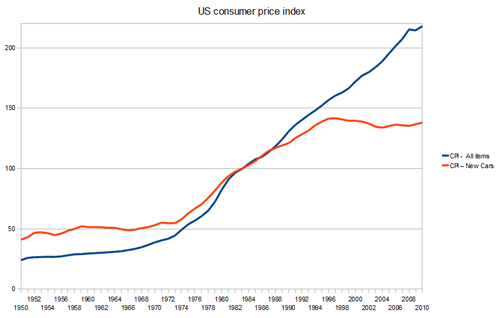Call me a stereotype of the scientist buried in his own irrelevant little world, but it occurred to me that I know far more about how to manipulate the behaviour of transformed cell lines than that of people. The War On The Motorist™ was, of course, part of the great evil Labour project to change some of our more anti-social and self-destructive behaviours. So I thought I should probably find out about how these government-led behavioural change projects work.
There are, of course, all sorts of different ways that governments can try to reduce destructive behaviour, from outlawing it to asking nicely, via making the bad options harder and making the good options easier:
(This table, incidentally, neatly describes where the chaps at Cycle Chat slipped up when claiming that the rise in domestic recycling rates demonstrates that we can achieve mass cycling without cycling facilities: mass domestic recycling required a change in the physical environment — kerbside recycling boxes — exactly equivalent to the changes to the physical environment that are required before we can expect most people to cycle.)
The current government has an ideological bias against some of these varieties of behavioural change, and in favour of others.* Regulation and taxation is, of course, off the agenda. Rather, the government says it wants to influence behaviour by making it easier for us to make the right choices. It will do this, it claims, without making the bad choices impossible or even more expensive, and without even requiring our conscious deliberation. In the fashionable pop-economics terminology, it’s going to “nudge” us in the right direction.
The pop-economics writers have some favourite examples of “nudges”. Changing the environment by putting the fruit bowl in plain view and easy reach, without banning the junk food option. Or reducing laundry loads by changing the hotel bathroom signs from “hang your towel on the rack if you are going to reuse it” to “most guests hang their towels up and reuse them”. The environment or the information nudges people into making the right choice, without actually taking choice from them.
It all sounds very nice, but I wonder what the evidence says about the government’s approach? Does it really work? Are they doing it right? And what does it mean for transport and The War On The Motorist?
Luckily, the House of Lords Sci & Tech select committee are ahead of me. I like select committees. So far as I can tell, their job is to closely and carefully scrutinise what the government is doing (or failing to do), point out when the evidence indicates that they’re messing things up, and then to be completely ignored by government, media, and the unfortunate oblivious electorate. The HoL Sci & Tech committee produced a report a couple of weeks ago looking at the present government’s approach to behaviour change programmes, and in particular, the extent to which they were informed by the evidence of what works and what is worthwhile. I’ve been scrolling through it and will probably dump a load of thoughts on the blog this week.
My initial concern was that, though it speaks of nudges and wanting to avoid limiting choice through regulation, it is not regulation that the government is really trying to avoid: it is spending money on doing a job properly. We’ll see if I’m at all reassured by the time I’ve finished digesting it and posting about it…
* Of course, the far end of the libertorian wing will object to any and all government-led behavioural change, but I will assume for now that we all understand why we need it, and why we need it done properly






